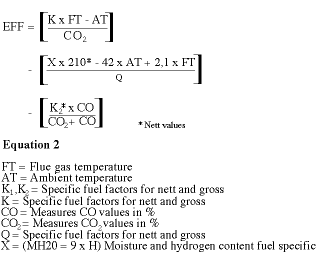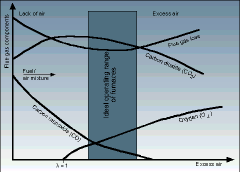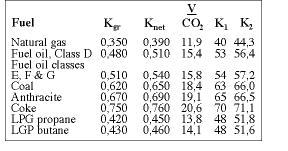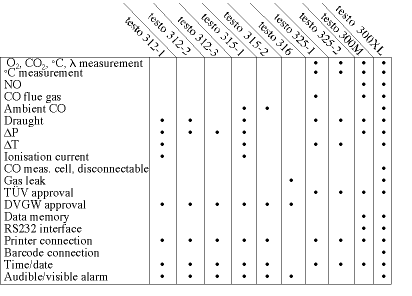
Ideal operating range of furnaces
The aim of flue gas measuring technology is to ensure the environmentally friendly and economic operation of furnaces. The given formulae and tables can be used to understand flue gas measuring technology. They are also stored in the Testo flue gas analysers. All of the calculations are carried out automatically.
Combustion efficiency is calculated by subtracting the combusting losses from 100% or maximum efficiency.
Efficiency of a small furnace
Taking into account the condensation heat, values of more than 100% are possible in furnaces which operate in the so-called gross calorific value mode. This impossible value shown in the display indicates that the furnace is in the correct operating mode.
Gross and net efficiency
Efficiency values are calculated to give two values, gross and nett. Gross values are calculated including losses due to the water contents of fuels, nett values exclude these losses, this results in the nett value being higher than the gross efficiency.
The most important factor in calculating the efficiency level is the difference between the flue temperature and the ambient temperature. Testo analysers can simultaneously measure both ambient and flue gas temperatures.
Calculation of flue gas efficiency

Calculating CO2

In order to achieve full combustion it is necessary to supply the combustion with more air than is theoretically necessary. The ratio of this air to the theoretical air requirement is known as excess air.
Efficiency
Maximum efficiency is achieved if there is slight air excess and the flue gas efficiency is as high as possible.

NOX measurement
NOX consists of NO and NO2. NO2 levels in smaller heating installations which are less than 3% of the total NOX level can be ignored. The measurement of NOX is more important for the correct adjustment of modern NOX reduced burners. However, there is no obligation to measure.

Optimum setting of heating installations
Fifteen years ago, chemical kits, the bimetallic thermometer and the soot pump were the only aids available to set the optimum operative range in furnaces.
The chemical kits always had one big disadvantage: a continuous measurement during adjustment work was not possible.
The effect of a correction to a burner setting was not immediately indicated. It is only with the following measurement that a result was shown.
Then reset ... shake again ... set ... shake etc.
This time-consuming and therefore very expensive method of flue gas measurement helped the electronic flue gas analysers to become an immediate success.

Electronic flue gas analysers
The flue gas analysers from Testo have been proving themselves for 15 years. They are ready to operate after one minute and can continuously measure values. In this way the rapid measurement and adjustment of furnaces is guaranteed. The life of the inserted measuring cells is between two and three years.

Gas measuring cells
The chemical measuring cells in Testo flue gas analysers are used throughout the world and are of the highest technical standard.
Many hours of work are required in research and development to create a suitable environment for the gas cells which includes the optimisation of the gas paths, correct calculation of cross-sensitivities and the uncomplicated method of changing the gas measuring cells by the user.
Fifteen years experience in the development of flue gas analysers as well as many years of cooperation with independent institutes measuring different measuring cell types have given Testo a headstart in this field.
This headstart is passed on to the customer in the form of compact, robust, high precision instruments and easy to change measuring cells.
For further technical details contact Unitemp on tel: (021) 762 8995, [email protected] or

© Technews Publishing (Pty) Ltd | All Rights Reserved